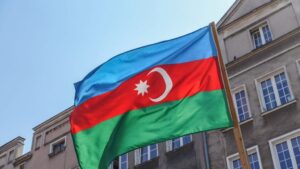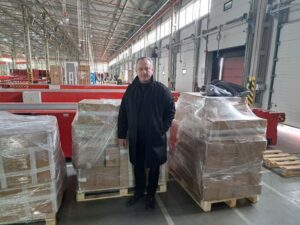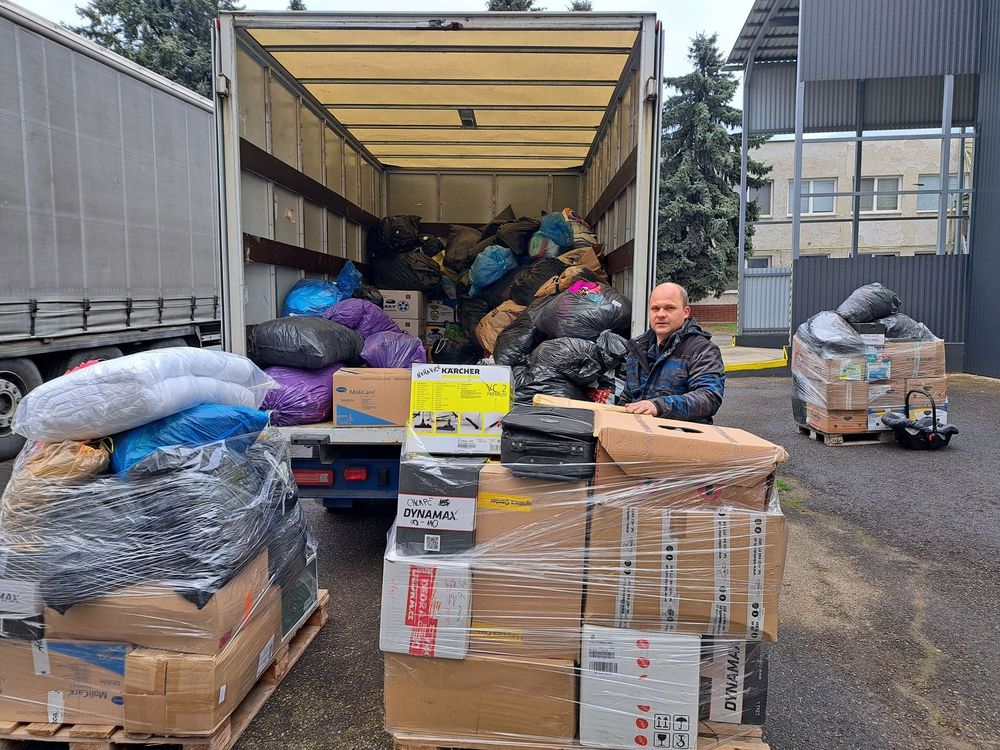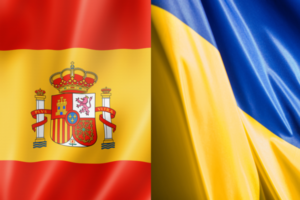
The United Nations is short of more than a billion dollars to provide humanitarian aid to Ukraine in 2025, UN Emergency Relief Coordinator for Ukraine Matthias Schmale said at a briefing in Geneva, Deutsche Welle reports.
He noted that about four million Ukrainian residents received humanitarian aid this year, but funding remains insufficient.
“This year, donors have provided only $1.15 billion, which is 44% of the total amount estimated to be needed for humanitarian aid to Ukraine,” Schmale said.
According to the UN, due to massive Russian strikes, part of Ukraine’s energy, water, and heating systems remain paralyzed, so with winter approaching, the affected regions need urgent support.

Ukraine received a new batch of humanitarian aid from Azerbaijan to restore energy infrastructure damaged during the armed conflict, according to Ukrainian and Azerbaijani press services.
The aid consists of the supply of electrical equipment worth $2 million, approved by a decree of the President of the Republic of Azerbaijan, Ilham Aliyev, dated August 11, 2025, with funds from the presidential reserve fund and the 2025 state budget. The equipment includes generators, transformers, and electrical cables manufactured in Azerbaijan.
The first batch of aid — about 10 trucks sent from the Sumgait Technology Park — contains about 90,000 meters of electrical cables, 25 generators, and seven sets of transformers. They are intended to restore stable power supply in regions of Ukraine destroyed by Russian strikes.
Ukrainian President Volodymyr Zelensky and Azerbaijani President Ilham Aliyev discussed energy cooperation and interaction with the US and European partners during a telephone conversation on August 10. The parties emphasized that the assistance is based on the principles of humanism and partnership enshrined in bilateral agreements, including the 2000 Treaty on Friendship, Cooperation, and Partnership and the 2008 Declaration on Strategic Partnership.
Diplomatic relations between Ukraine and the Republic of Azerbaijan were established on February 6, 1992, when Azerbaijan officially recognized Ukraine’s independence. The Ukrainian Embassy in Baku began operating in 1996, and the Azerbaijani Embassy in Kyiv in 1997.

Switzerland is maintaining its level of involvement in helping Ukraine with humanitarian response despite the global recession in donor support, said Serge Umov, Head of Humanitarian Aid in Ukraine at the Swiss Agency for Development and Cooperation.
“As for Switzerland, I am pleased to announce that we are not reducing our humanitarian commitments. Our assistance is not as large as that provided by the United States and other European partners. But we are maintaining our involvement for at least the next few years. We do not plan to reduce our efforts to provide humanitarian assistance to Ukraine,“ said Serge Umov during a roundtable discussion titled ”Humanitarian Action in War: Protection of Personnel, Innovation and Influence on World Politics” at Interfax-Ukraine.
At the same time, according to the representative of the Swiss Agency, the current crisis opens up opportunities to rethink approaches to humanitarian response.
“We will need, and we are already doing, to change some things in our approaches and the way we operate. Every crisis also opens up new opportunities,” he added.
He called localization of humanitarian aid and support for the capacity of Ukrainian organizations one of the priorities of the conditions.

On April 9, 2025, Eduard Burash, the ambassador of Transcarpathia, the head of the Feman organization and an advisor to the Slovak Children’s Ombudsman, organized the delivery of a large batch of humanitarian aid to Chernihiv region.
The initiative arose after the appeal of Colonel Mykola Zhuravlev of the Armed Forces of Ukraine, who reported a critical situation in the village of Chaikino in Chernihiv region. The settlement is under shelling and 90 children still live there in need of food, hygiene products and other essentials.

Burash’s partners, Natalia Aleksandrova and Vladimir-Franz von Habsburg, as well as the organization “Smile as a Gift” represented by Boleslav Leshaw and Boleslav Drab, took part in the formation of the humanitarian aid. Anna Ivankova from GKCh Košice, Marcel Vrhota, Peter Jelen, Peter Roman, Gabica Jelenova and others also provided assistance.
The truck delivered beds, mattresses, hygiene products, detergents and food. The aid was organized through partners from the Ukrainian House of Charity under the patronage of Franz Volodymyr von Habsburg. In Uzhhorod, the cargo was loaded onto another truck for further transportation. Uzhhorod City Council member Arsen Melkumian and Nova Poshta employees assisted in the transshipment.
The customs and border services of Slovakia and Ukraine promptly processed the necessary documents, which allowed for unimpeded border crossing.

The Ministry of Foreign Affairs of Finland has decided to allocate humanitarian aid to Ukraine in the amount of 16 million euros.
According to the Finnish Foreign Ministry, the aid will be provided through UN humanitarian agencies and the International Committee of the Red Cross (ICRC).
“Finland has been supporting Ukraine’s humanitarian needs since the first day of Russia’s invasive war and will continue to do so. The need for humanitarian aid in Ukraine is enormous and our assistance is important,” said Minister of Foreign Trade and Development Ville Tavio.
Finland also provides assistance to address the serious refugee crises in Africa and the humanitarian situation in the Middle East. Finland is providing €2 million in support of the World Food Program (WFP) operation in Sudan, €2.5 million to the WFP operation in Gaza, and €2 million to the UNHCR regional refugee operation in Syria, among other operations. Support is also provided to Ethiopia, the Horn of Africa and the Great Lakes and Sahel regions. In Asia, Finland supports Afghanistan and Myanmar through the International Red Cross Movement.
Finland is also providing €2 million to fund the work of the World Food Program and UNHCR on the inclusion of people with disabilities. The assistance is targeted at people with disabilities, who are often in the most vulnerable situation. In addition, 2 million euros are being provided to develop WFP’s school feeding activities and support school feeding, especially in Africa.
In addition to these decisions, Finland provides core funding to multilateral humanitarian organizations. In addition, preparations are underway for humanitarian assistance to be channelled through Finnish civil society organizations. The rest of the humanitarian funding from the budget will be provided later this year.

During his visit to Lviv, Spanish Foreign Minister Jose Manuel Albares Bueno announced an additional EUR 10 million in humanitarian aid to Ukraine.
According to the Spanish Foreign Ministry, Albares visited Ukraine on January 28 for the third time since the start of Russia’s full-scale aggression.
Albares, along with his Ukrainian counterpart Andriy Sybiga and UNESCO Director-General Audrey Azoulay, inaugurated a cultural center created through the Spanish-University of Spain Development Cooperation Trust Fund. The center, funded by AECID, was created to create a space specifically dedicated to culture as a factor of peace and resilience in the wartime and post-war context in Ukraine, a country whose cultural productive structure lost 90% of its resources due to the war unleashed by the Russian invasion.
“This center complements Spain’s comprehensive commitment to Ukraine’s reconstruction, which is reflected today in a new announcement of EUR 10 million from the Spanish Humanitarian Aid Cooperation, adding to the 100 million that Spain has provided to Ukraine since the beginning of the war,” the statement said.
This area of humanitarian aid is complemented by another – reconstruction, which has accumulated EUR400 million since the beginning of Russian aggression.
Albares also visited a hospital in Lviv, where he announced that Spain would provide a Spanish team of medical trainers to help medical professionals in the hospital.
Albares reiterated Spain’s support for Ukraine during the Russian aggression. In particular, the training of the Armed Forces of Ukraine in Spain includes about 7000 trained military personnel.
In addition, Albares also reaffirmed support for Ukraine’s accession process to the European Union, which began during Spain’s EU presidency, reminding Ukraine that Spain has always expressed its strong support for it.